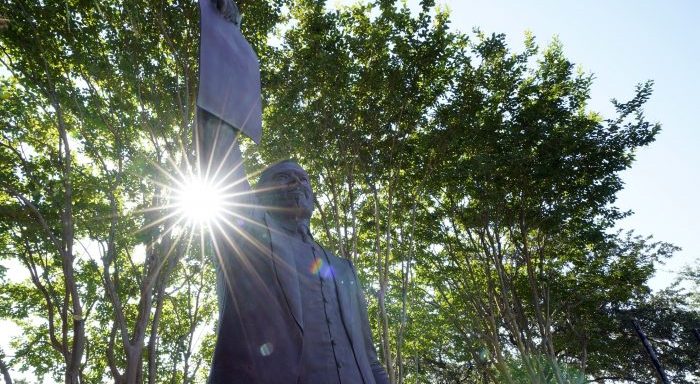INTELBRIEF
June 19, 2020
IntelBrief: The Importance of Celebrating Juneteenth in the United States

- Juneteenth commemorates an end to slavery in the United States, when on June 19, 1865, enslaved African-Americans were freed in Galveston, TX, months after the end of the American Civil War.
- It is critical to recognize the contribution that African-Americans make to this country and move toward a place where ‘liberty, and justice for all’ is not just a slogan, but something that Americans work to make a reality.
- Political discourse is dominated by debates on whether to remove Confederate statues and rename U.S. military bases, including Fort Bragg, Fort Hood, and Fort Benning.
- This is not a fleeting moment, but an opportunity to listen, engage in dialogue, and reflect inward as a nation while doing some long overdue soul-searching about what the United States stands for as a country.
Juneteenth commemorates an end to slavery in the United States, when on June 19, 1865, enslaved African-Americans were freed in Galveston, TX. When Union General Gordon Granger arrived in Galveston to announce the end of the Civil War, he effectively operationalized the ‘Emancipation Proclamation’ signed by President Abraham Lincoln on New Year’s Day in 1863. Juneteenth is alternatively referred to as ‘Emancipation Day,’ or ‘Freedom Day.’ The holiday is growing in popularity across the country, at a time when highlighting the injustices against African-Americans has never been more important. Recognizing the struggles of African-Americans in the United States pays homage to the legacy of the Civil Rights Movement, but it is also a painful acknowledgment that as a country, the United States still has a long way to go to right historical wrongs and bring about a more peaceful and equitable society.
Following the murder of George Floyd and nationwide protests bringing attention to police brutality against African-Americans, there is a greater focus nationally on this holiday, often celebrated with family get-togethers and festivals or parades in larger cities throughout the country, from Denver, CO to Atlanta, GA and beyond. It is critical to recognize the contribution that African-Americans make to this country and move toward a place where ‘liberty, and justice for all’ is not just a slogan, but something that all Americans work to make a reality each and every day. The United States prides itself on being a democratic exemplar for the rest of the world, but democracy is about more than just elections. Democracy also means protecting and enshrining the right of African-Americans, and other ethnic, racial, and religious minorities, not just in name, but in deed. When the United States criticizes authoritarian regimes in China, Iran, and North Korea for human rights abuses, dictators in those countries accuse Washington of hypocrisy and point to police brutality against African-Americans and a country still coming to terms with daily examples of racism and division. There is also a growing threat posed by neo-Nazis, violent white supremacists, and anti-government militia groups eager accelerate chaos and fight a new Civil War.
The legacy of the Civil War continues to haunt the United States, which is still reckoning with its past 155 years after the war officially came to an end. Political discourse is dominated by arguments over whether or not to take down Confederate statues and rename U.S. military bases that commemorateConfederate military officers, including Fort Bragg (NC), Fort Hood (TX), and Fort Benning (GA). Responding to growing pressure to rename the bases, President Trump took to Twitter on June 10th to declare, ‘my Administration will not even consider the renaming of these Magnificent and Fabled Military Installations. Our history as the Greatest Nation in the World will not be tampered with. Respect our Military!’ Many argue that renaming the bases is respecting the military, especially since the Confederacy attempted to secede from the United States, fought against the U.S. military, and did so in part to retain the right to enslave others. Retired 4-star general and former CIA director David Petraeus recently penned an article in The Atlantic in which he argued that ‘It is time to remove the names of traitors…from our country’s most important military installations.’
Momentum is growing to for the U.S. federal government to declare Juneteenth a national holiday, which would further elevate its profile and help educate Americans about what the holiday represents and why it is so important, not just for African-Americans, but for the country as a whole. Recognizing historical injustices and the legacy of slavery is crucial to understanding the demand for racial justice in 2020. And there is optimism that the current groundswell of activism and awareness has real potential to bring about genuine and much-needed political change. Writing in Foreign Affairs, U.S. Senator Chris Murphy (D-CT) recently proclaimed, ‘’Fears that the new tempest over racial justice is making the United States look weak in the eyes of the world are totally and completely upside down. This moment of reckoning could end up becoming a defining advertisement for the American model…’ This is not simply a fad or a fleeting moment, but a real opportunity to listen, to engage in meaningful dialogue, and to be introspective as a nation while the body politic does some long overdue soul searching about what the United States stands for as a country.
.
For tailored research and analysis, please contact: info@thesoufancenter.org